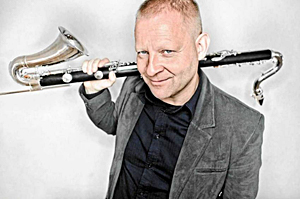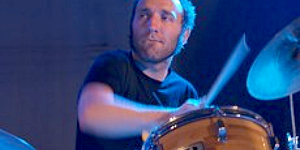University of Michigan Copernicus Center for Polish Studies (CCPS) on Jazz in Poland

As part of its regular public lecture series, the University of Michigan Copernicus Center for Polish Studies (CCPS) will present a combined set lecture and concert. The speaker will be Maciej Lowenstein, who is a renowned professor of quantum physics at the Institut de Ciències Fotòniques in Barcelona. In addition to leading research programs, lecturing all over the world, and authoring many scholarly works, Prof. Lowenstein is a prolific analyst of the more progressive movements in jazz, with a special focus on developments in Poland; he is the author of a massive book Polish Jazz Recordings and Beyond and is now finishing an even more copious second version.
Jazz has a long history in that country, going back to the thirties of the last century, but it was only in the late fifties, when government hostility against the music relaxed, that Polish jazz came into its own and has developed a rich, complex, and multifaceted tradition all its own. Among the various strands of the music, one stands out today, the free or avant-garde movements that developed in parallel, but often in contrast to, the more establishment varieties. Prof. Lowenstein will present a historical review of these free improvisation and jazz avant-garde movements, starting from the 1960s, as well as the early attempts to play free jazz by Tomasz Stańko or Leszek Żądło. He will comment on the fusion-dominated 1970s and 1980s, then focus on the yass movement of the 1990s. The important role of the late Andrzej “Major” Przybielski will be stressed. He will sketch the present free improvisation scene in Poland and describe a few of the leading figures of this scene: Mikołaj Trzaska, Rafał Mazur, Jerzy Mazzoll, Wacław Zimpel, Piotr Mełech, Paulina Owczarek, and more. The lecture will be illustrated with numerous musical examples.
The Zoom lecture, followed by a question-and-answer period, will take place at noon on Thursday, February 18. Access is free, but registration is required. Fuller information about the lecture and author can be accessed at the CCPS web site.
In tandem with Maciej Lowenstein’s lecture, CCPS will present a concert from Warsaw by two of the most eminent Polish free jazz musicians, Mikołaj Trzaska (alto saxophone and bass clarinet) and Macio Moretti (drums and bass). This presentation, at no charge, will be broadcast on Saturday, February 20 in collaboration with the Michigan Theatre in Ann Arbor. Details and precise links for viewing will be forthcoming; the details are available here.
Here is some more information about the musicians:
 Mikołaj Trzaska — saxophonist, bass clarinetist, and film score composer — grew out of yass, a socio-artistic movement that brazenly challenged the rigidity of the institutionalized mainstream Polish jazz environment during the 1980s and 1990s. Free from any specific doctrine and open to all forms of artistic expression, the musicians successfully impacted the jazz scene in the country. Trzaska was the co-founder of the most important yass group—the celebrated Miłość ensemble that lasted, off and on, from 1988 to 2002, and the of the equally creative Łoskot, founded in 1993. Although the impetus of yass faded away many years ago, Trzaska’s status remained and he went on to become one of the main leaders of the Polish scene, working as well with the top tier of international improvisors. After the yass period, he recorded a few concentrated quieter albums with the renowned Oleś brothers bass/drum duo. Trzaska has accompanied poets such as Marcin Świetlicki and Jurii Andrukhovych and created musical-literary projects with the renowned Polish writer/journalist/critic Andrzej Stasiuk. Today, he works with many groups, including his own international trio Volumen, Ken Vandermark’s Resonance Ensemble, Magic with Joe McPhee, and the unique trio Shofar with Raphael Rogiński and Macio Moretti, which explores unique new improvisational perspectives on traditional Jewish music. He has also established himself as a major award-winning film music composer, working with the director Wojciech Smarzowski. But his main focus of self-realization is grounded in radical free jazz: he travels the world cooperating with some of the world’s major improvisors such as Peter Brötzmann, Joe McPhee, and Ken Vandermark. Trzaska first performed in Ann Arbor in 2010 in a duet with the magnificent trombonist Steve Swell at the Kerrytown Concert House, and returned in 2013 as the leader of Shofar, a trio that reinvents traditional Jewish music though free improvisation.
Mikołaj Trzaska — saxophonist, bass clarinetist, and film score composer — grew out of yass, a socio-artistic movement that brazenly challenged the rigidity of the institutionalized mainstream Polish jazz environment during the 1980s and 1990s. Free from any specific doctrine and open to all forms of artistic expression, the musicians successfully impacted the jazz scene in the country. Trzaska was the co-founder of the most important yass group—the celebrated Miłość ensemble that lasted, off and on, from 1988 to 2002, and the of the equally creative Łoskot, founded in 1993. Although the impetus of yass faded away many years ago, Trzaska’s status remained and he went on to become one of the main leaders of the Polish scene, working as well with the top tier of international improvisors. After the yass period, he recorded a few concentrated quieter albums with the renowned Oleś brothers bass/drum duo. Trzaska has accompanied poets such as Marcin Świetlicki and Jurii Andrukhovych and created musical-literary projects with the renowned Polish writer/journalist/critic Andrzej Stasiuk. Today, he works with many groups, including his own international trio Volumen, Ken Vandermark’s Resonance Ensemble, Magic with Joe McPhee, and the unique trio Shofar with Raphael Rogiński and Macio Moretti, which explores unique new improvisational perspectives on traditional Jewish music. He has also established himself as a major award-winning film music composer, working with the director Wojciech Smarzowski. But his main focus of self-realization is grounded in radical free jazz: he travels the world cooperating with some of the world’s major improvisors such as Peter Brötzmann, Joe McPhee, and Ken Vandermark. Trzaska first performed in Ann Arbor in 2010 in a duet with the magnificent trombonist Steve Swell at the Kerrytown Concert House, and returned in 2013 as the leader of Shofar, a trio that reinvents traditional Jewish music though free improvisation.
 Macio Moretti is a drummer and bassist (and occasionally a poor singer and even poorer guitar player) who works in many genres, from avant metal to jazz. He has founded or co-founded so many musical groups and organizations that it is practically impossible to count them, but bands such as Mitch & Mitch and LXMP, as well as the recording label Lado ABC, might be the most important of them. With these aforementioned bands he has had the pleasure of recording and releasing records with major artists such as Kazuhisa Uchihashi, Felix Kubin, Clayton Thomas, Kassin, and Zbigniew Wodecki. Besides all this, he is also an award-winning graphic designer, the father of two, a bread maniac, and has absolutely no interest in motorization.
Macio Moretti is a drummer and bassist (and occasionally a poor singer and even poorer guitar player) who works in many genres, from avant metal to jazz. He has founded or co-founded so many musical groups and organizations that it is practically impossible to count them, but bands such as Mitch & Mitch and LXMP, as well as the recording label Lado ABC, might be the most important of them. With these aforementioned bands he has had the pleasure of recording and releasing records with major artists such as Kazuhisa Uchihashi, Felix Kubin, Clayton Thomas, Kassin, and Zbigniew Wodecki. Besides all this, he is also an award-winning graphic designer, the father of two, a bread maniac, and has absolutely no interest in motorization.
For those who may be interested in delving more fully into Polish jazz, the Polish Cultural Institute in New York will be providing free streaming from the Jazztopad Festival in Wrocław on January 16 (Łukasz Ojdana solo), February 13 (Radek Nowicki Quartet), and February 19 (Maniucha and Ksawery). For more information, go to instytutpolski.